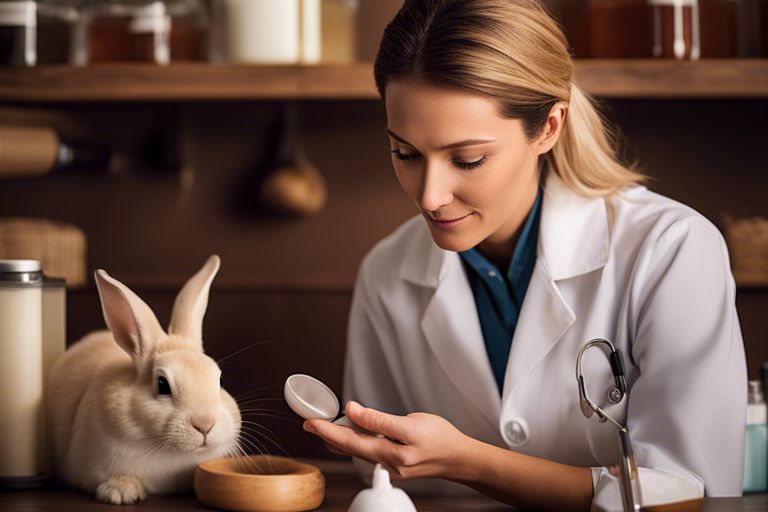Addressing the nasal breathing issues in your Flemish Giant rabbit is crucial for their overall well-being. As a responsible rabbit owner, it is important to be aware of the signs and symptoms of respiratory problems in your pet. If left untreated, these issues can lead to life-threatening consequences. In this informative blog post, you will learn about the common causes of nasal breathing difficulties in Flemish Giant rabbits and effective methods to alleviate these problems. By taking the appropriate steps, you can ensure that your beloved pet is able to breathe comfortably and lead a healthy, happy life.
Key Takeaways:
- Monitor Environmental Conditions: Pay attention to the temperature and humidity in your Flemish Giant rabbit’s living space, as extreme conditions can exacerbate breathing difficulties.
- Regular Grooming: Keep your rabbit’s fur clean and well-groomed to prevent it from getting matted and obstructing their nasal passages.
- Seek Veterinary Care: If your rabbit is experiencing chronic nose breathing difficulties, consult a veterinarian who can diagnose any underlying health issues and provide proper treatment.
- Prevent Respiratory Infections: Keep your rabbit’s living environment clean and free from potential sources of respiratory infections, such as dust or mold.
- Proper Diet and Hydration: Provide your rabbit with a balanced diet and access to fresh, clean water to support their overall respiratory health.
Anatomy of Flemish Giant Rabbits
Assuming you want to alleviate nose breathing difficulties in your Flemish Giant rabbits, it’s essential to understand their anatomy. This knowledge will help you identify potential issues and take preventive measures to ensure your rabbits’ respiratory health.
Nasal Structure and Function
The nasal structure of Flemish Giant rabbits is characterized by large, open nasal passages and a well-developed sense of smell. Their long ears are also connected to the nasal cavity, aiding in respiratory regulation. The nasal passages are lined with mucous membranes that help in humidifying and filtering the air that the rabbit breathes, providing essential moisture and removing particles before they reach the lungs.
Common Respiratory Issues
Unfortunately, Flemish Giant rabbits are prone to respiratory issues such as snuffles, pneumonia, and nasal congestion. These issues can be caused by bacterial or viral infections, stress, poor ventilation, or inadequate care. Respiratory problems can become life-threatening if left untreated, so it’s crucial to monitor your rabbits for any signs of respiratory distress and seek prompt veterinary care if needed.

Causes of Breathing Difficulties
Clearly, there are several potential causes of breathing difficulties in Flemish Giant rabbits. It’s important to be aware of these potential causes so that you can take the necessary steps to alleviate your rabbit’s discomfort. For a comprehensive list of rabbit emergencies, you can visit Rabbit Emergencies.
Environmental Factors
Environmental factors can have a significant impact on your Flemish Giant rabbit’s breathing. Dust, pollen, and other airborne irritants can trigger respiratory issues in rabbits, leading to breathing difficulties. Additionally, poor air quality and inadequate ventilation can exacerbate these problems. If you notice that your rabbit is experiencing difficulties breathing, it’s important to evaluate their living environment and make adjustments as necessary. Regular cleaning and proper air circulation can help alleviate these environmental factors and improve your rabbit’s respiratory health. This can be achieved by keeping their living space clean and providing ample fresh air circulation.
- Dust, pollen, and airborne irritants
- Poor air quality
- Inadequate ventilation
This can help alleviate your rabbit’s breathing difficulties and create a more comfortable living environment.
Health-Related Causes
There are several health-related causes that can contribute to breathing difficulties in Flemish Giant rabbits. Respiratory infections, allergies, and obesity can all impact your rabbit’s ability to breathe comfortably. Additionally, heart disease and dental issues can also lead to respiratory problems in rabbits. If you notice any signs of respiratory distress in your rabbit, such as wheezing, labored breathing, or a lack of appetite, it’s essential to seek veterinary care immediately. Early intervention and proper medical treatment can help address these health-related causes and alleviate your rabbit’s breathing difficulties.
Diagnosis and Treatment
Despite their resilience, Flemish Giant rabbits can still suffer from nose breathing difficulties, which can be caused by a variety of factors such as respiratory infections, dental problems, or allergies. If your rabbit is exhibiting signs of respiratory distress, it is crucial to seek a thorough diagnosis and proper treatment as soon as possible.
How to Recognize Symptoms
When it comes to recognizing symptoms of nose breathing difficulties in your Flemish Giant rabbit, it is important to be vigilant. You may notice persistent sneezing, nasal discharge, or labored breathing. Your rabbit may also exhibit a loss of appetite, lethargy, or audible breathing sounds. If you observe any of these symptoms, it is essential to seek veterinary care immediately for a thorough evaluation.
Professional Veterinary Care and Interventions
When your Flemish Giant rabbit is experiencing nose breathing difficulties, it is imperative to seek professional veterinary care promptly. Your veterinarian will conduct a comprehensive physical examination and may recommend diagnostic tests such as blood work, radiographs, or nasal endoscopy to identify the underlying cause. Depending on the diagnosis, treatment interventions may include antibiotics for respiratory infections, dental care for overgrown teeth, or environmental modifications to reduce allergen exposure. It is crucial to follow your veterinarian’s recommendations and closely monitor your rabbit’s progress to ensure a successful outcome.
Preventive Measures and Home Care
After addressing immediate breathing difficulties in your Flemish Giant rabbit, it’s important to take preventive measures and provide home care to alleviate future nose breathing difficulties. By implementing a few simple strategies, you can help ensure your rabbit’s respiratory health and well-being.
Maintaining a Healthy Living Environment
Keeping your rabbit’s living environment clean and free from potential respiratory irritants is essential for preventing nose breathing difficulties. Regularly clean and change your rabbit’s bedding to reduce the build-up of dust, mold, and other allergens that could trigger respiratory issues. Additionally, ensure that the area where your rabbit lives is well-ventilated to promote fresh air circulation and minimize the risk of respiratory problems.
Dietary Considerations and Supplements
The diet of your Flemish Giant rabbit plays a crucial role in their overall health, including respiratory health. Provide a well-balanced diet that includes fresh hay, high-quality pellets, and fresh vegetables to support your rabbit’s immune system and respiratory function. Incorporating supplements rich in vitamin C and E can also help boost their respiratory health and reduce the risk of nose breathing difficulties.
Alleviating Nose Breathing Difficulties in Flemish Giant Rabbits
Drawing together the key points discussed, you can alleviate nose breathing difficulties in Flemish Giant rabbits by ensuring a clean and dust-free environment, monitoring their weight to prevent obesity-related issues, and providing adequate ventilation and space in their enclosure. Furthermore, regular grooming to manage any excess fur around the nose, and seeking prompt veterinary assistance at the first signs of breathing difficulties are essential in maintaining the respiratory health of your Flemish Giant rabbit. By implementing these strategies, you can help your pet rabbit breathe more comfortably and lead a healthier, happier life.
FAQ: Alleviating Nose Breathing Difficulties in Flemish Giant Rabbits
Q: What are the common causes of nose breathing difficulties in Flemish Giant rabbits?
A: Common causes of nose breathing difficulties in Flemish Giant rabbits include respiratory infections, dental problems, allergies, or nasal blockages due to foreign objects or excessive mucus.
Q: How can I help my Flemish Giant rabbit breathe better through its nose?
A: To alleviate nose breathing difficulties in Flemish Giant rabbits, it is important to provide a clean and stress-free environment. Regularly cleaning their living space, preventing exposure to allergens, and ensuring proper dental care can help improve nasal breathing. In addition, ensuring proper hydration and diet can also aid in reducing mucus build-up and nasal congestion.
Q: When should I seek veterinary care for my Flemish Giant rabbit’s nose breathing difficulties?
A: If your Flemish Giant rabbit is experiencing persistent or worsening nose breathing difficulties, it is crucial to seek veterinary care immediately. Respiratory issues can quickly escalate in rabbits and may indicate an underlying health problem that requires prompt treatment. A veterinarian can conduct a thorough examination, including diagnostic tests if necessary, to determine the cause of the nose breathing difficulties and provide appropriate treatment.
